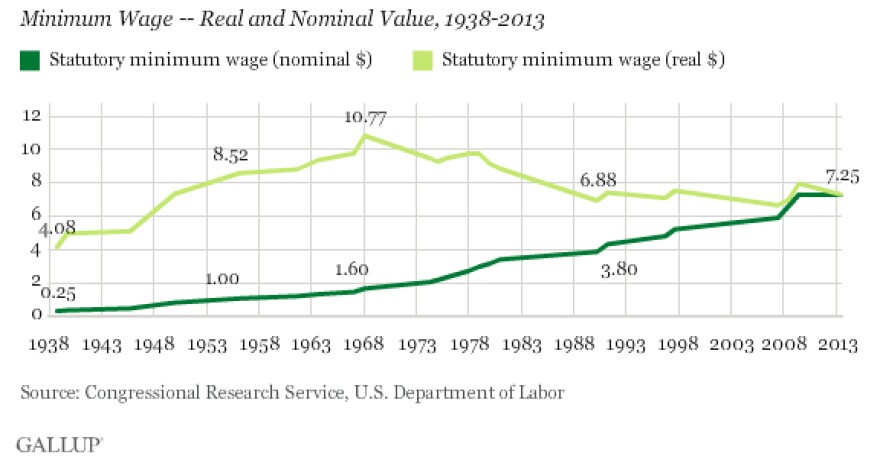In the first segment:
An Ohio Wal-Mart is having a food drive so that needy employees can have a good Thanksgiving. McDonald's has a phone resource line directing its full-time employees to public services like food pantries, SNAP, and heating assistance.
Both instances highlight the issue of the poor working for minimum wage. The current wage, $7.25 per hour, was raised in 2009 from $6.15 per hour, and according to the Department of Labor that dollar doesn't go as far as it used to.
According to a recent Gallup poll, raising the minimum wage has become increasingly popular. Three in four American's support the idea of raising the minimum wage to $9 per hour. The same pollsters note this is a five point increase from earlier in the year.

Democrats in the U.S. Senate took up the issue earlier in the year with Sen. Tom Harkin, D-Iowa, proposing it be raised to $10.10 per hour.
We speak with Dr. Slyvia Allegretto, economist at the Institute for Research on Labor & Employment at the University of California at Berkeley, about why the minimum wage should go up.
In the second segment:
The City of San Antonio is considering a bag ban for single-use plastic bags. District 7 City Councilman Cris Medina claims it costs the city $1.3 million per year in environmental clean up and that money could be better spent. The Citizen's Environmental Advisory Committee endorsed a ban or the levying of a fee.
Obviously retailers in Texas aren't happy about the idea, saying it drives up costs for everyone without a real benefit. The Texas Retailers Association released a statement to "The Source" stating despite their name, "single-use" bags are anything but, and can also line trash cans and be used for things like pet waste disposal. [see full statement below]
In Texas, six cities have banned plastic bags, including Austin. Dallas is considering a proposal that would either ban or levy a fee on consumers with a vote scheduled for early next year.
We are joined by Andrea Nocito, chair of the Citizen's Environmental Advisory Committee and HEB Director of Public Affairs Dya Campos.
Texas Retailers Association Statement:
The simple truth is that, despite the commonly-used moniker, “single-use” bags that grocers and other retailers provide to their customers are anything but “single-use”. Consumers use those bags for lining trash cans, for diaper or pet waste disposal, for brown bag lunches and dozens of other uses. Additionally, the ones they don’t reuse are coming back into our recycle bins at HEB, Wal-Mart, Target, Walgreens, JC Penney, and other area retailers. (To find nearby stores with recycling canister programs, customers can go to www.abagslife.com and search the Zip Code locater). Those recycled bags (and other films, such as bread bags, newspaper bags, dry cleaner/clothing bags, etc.) are shipped to manufacturers to become useful second-generation products, such as fence posts, decking material, park benches, etc.). By recycling these plastic bags and other films, our customers help create new products and new jobs while diverting these bags away from the landfill in a more comprehensive manner than is achieved by simply banning a certain subset of the plastic bags that are present in the marketplace.
* The Source airs at 3 p.m. on KSTX 89.1 FM - audio from this show will be posted by 5:30 p.m.


